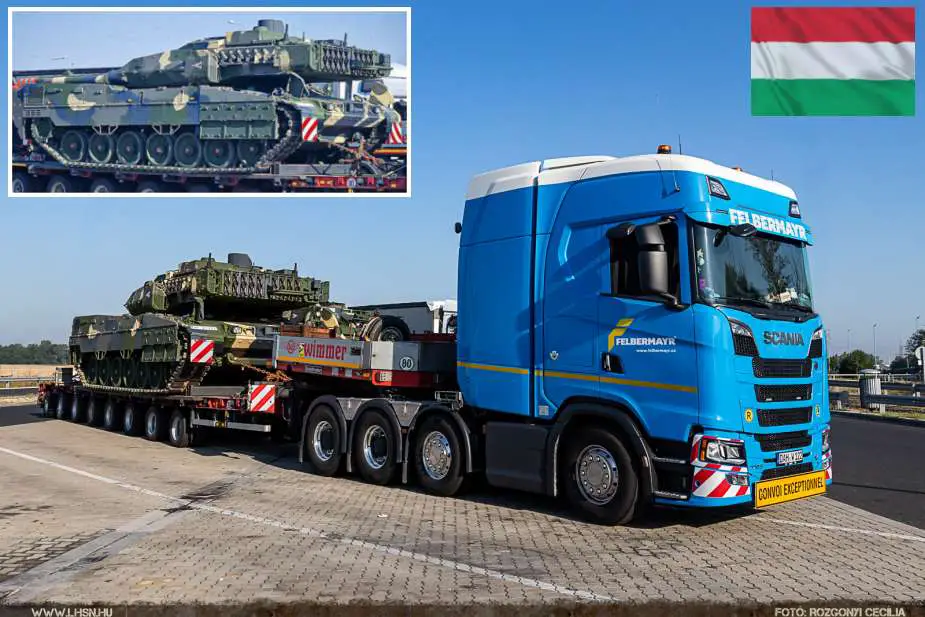Breaking news
Leopard 2A7HU tank spotted on Hungarian territory for the first time.
On August 22, 2023, a Facebook post by LHSN confirmed the sighting of the first Leopard 2A7HU tank within Hungarian borders. The sighting took place at the Lajta Rest Area in Mosonmagyaróvár, a town located in the Győr-Moson-Sopron County of northwestern Hungary, near the Austrian and Slovakian borders. The spotted convoy also included a Bergepanzer 3 Büffel based on the Leopard 2 main battle tank chassis.
Follow Army Recognition on Google News at this link

Leopard 2A7HU tank spotted on Hungarian territory for the first time (Picture source: LHSN/Facebook via Ronkainen/Twitter)
The vehicles that have recently arrived are reportedly serving as reference copies for now. These copies are intended to be returned to the manufacturer's base after the Hungarian customer receives a portion of their order, serving as a reference for ongoing production. This practice is consistent with similar arrangements, such as the case with PzH 2000 self-propelled trucks.
In December 2018, the Army Recognition editorial team reported that Hungary had signed a contract with German defense company Krauss-Maffei Wegmann (KMW) to modernize its military capabilities. This contract included the procurement of 44 Leopard 2 A7+ main battle tanks and 24 PzH 2000 howitzers. Additionally, Hungary acquired 12 used Leopard 2A4 main battle tanks from KMW for training purposes. This initiative was aimed at fostering greater cooperation among European armed forces.
The Leopard 2A7HU model plays a role in the development of the new Leopard 2A8 variant, expected to feature an upgraded engine and active protection systems. Initial deliveries of the Leopard 2A8 are anticipated to commence around 2025.
Spotted features of the Leopard 2A7HU variant include the incorporation of an FN Herstal Remote Weapon Station (RWS), improved roof protection, an upgraded FCS with automatic target tracking, and a new PERI RTWL stabilized commander's sight. The tank is a member of the 2A7+ family of variants, characterized by each variant being named after the country that initiated the order and tailored the Leopard according to its specific requirements. An example of this is the 2A7Q variant tailored for Qatar.
The Leopard 2A7+ is an evolution of the Leopard 2A6 model, offering enhanced protection and reconnaissance capabilities. Unveiled during the Eurosatory 2010 event in France, the tank has undergone testing and qualification by the German Army. It has seen deployment by Canada in Afghanistan under NATO command and has also been subject to export approvals, including a deal to sell units to Saudi Arabia.
The Leopard 2A7+ incorporates digitized technology and a multifunctional user concept to improve sustainability. Weighing 67.5 tonnes and manned by a crew of four, the tank features a communication interface for interaction with dismounted soldiers. The tank is equipped with the FLW 200 modular remote-controlled light weapon station for active self-defense, including automatic vehicle detection.
Armed with a 120mm L55/L44 smoothbore gun, the Leopard 2A7+ can utilize standard NATO ammunition as well as programmable 120mm HE rounds. The gunner's station features an EMES 15 stabilizing main sight and a FERO Z18 auxiliary sighting telescope. The driver benefits from combined thermal imaging and image intensifier night vision. Additional power generators can be added for checkpoint missions.
For comprehensive protection, the tank features a modular protection kit with passive armor modules, offering all-around defense against anti-tank missiles, mines, improvised explosive devices (IEDs), and rocket-propelled grenade (RPG) threats.
The commander's station incorporates the PERI RTWL stabilized glass optical periscope for day and night reconnaissance. This periscope integrates a third-generation Attica thermal imaging device, a daylight CCD camera, an image fusion function, fiber optic gyros, and a laser range finder.
Powering the Leopard 2A7+ is a V-12 MTU MB 873 engine, providing 1,500 horsepower and enabling a maximum speed of 72 km/h. The range averages 450 km.


























